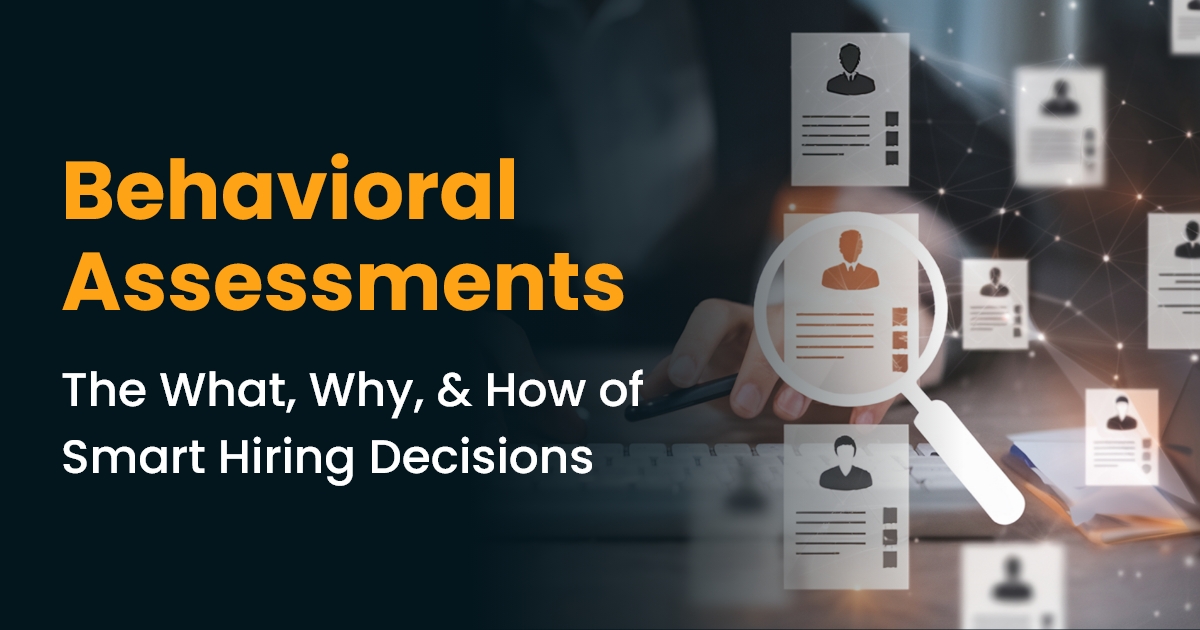More than just resumes and interviews, hiring the right candidate has much to do with understanding their personality, work style, and cognitive abilities so that companies can determine whether they fit a particular role. In this regard, behavioral assessments help recruiters to make data-based recruitment decisions on if to hire or not.
In this blog, we are going to talk regarding what behavioral assessments are, their importance in modern hiring, and how they can help the businesses make intelligent recruitment decisions.
What Are Behavioral Assessments?
Behavioral assessment is a structured testing and assessment of a person’s behavior traits, cognitive abilities, and personality. The intention of these assessments is to assist the employer in predicting the rational behavior of the candidate concerning the job and the challenges that occur in the workplace.
Therefore, significant areas measured in behavioral assessments include:
- Personality Traits- Evaluating aspects that range from extraversion to openness to experience and emotional stability.
- Cognitive Abilities – Tests logical reasoning, problem-solving, and adaptability.
- Workplace Behaviors – Involves teamwork, leadership potential, and communication skills.
- Situational Judgment – measures workplace-related decision-making. Unlike the traditional gut instinct methods of hiring through empirical evaluation, behavioral assessment looks scientifically at the true suitability of the applicant.
Why Behavioral Assessments Matter in Hiring?
Particularly, resume screening and interviews, which are the traditional methods of hiring, have their own limitations. Resumes speak of the past, and interviews could be biased. Thus, behavioral assessments take a data-driven approach in hiring for smart and effective decisions.
Advantages of behavioral assessment in recruitment:
- Accurate Job Fit: This ensures that potential recruits have traits and thinking ability appropriate for success in the role.
- Reduced Recruitment Bias: Objective tests eliminate unconscious biases and promote equitable recruitment.
- Increased Employee Retention: The most appropriate hire with the right cultural fit has been shown to increase retention rates.
- Higher Productivity: Employees whose behaviours are aligned with the job requirements are expected to show higher engagement and productivity levels.
- Easy Recruitment Process: Saves time when dealing with unqualified candidates and allows recruiters to hire based on top talent only.
- Behavioral assessments give the firm the entire picture of a person so that the decision is made based on facts rather than gut feelings.
How to Conduct Behavioral Assessments in Hiring?
Well, now we know the benefits of behavioral assessments; let’s explore how organizations can adapt them for effective hiring.
Step 1: Identify Key Behavioral Traits for Each Position
Before the assessment, the employer should define the uses and evidence of relevant behavioral behaviours and skills required for the role.
For example:
- Strong persuasion and communication abilities in a sales executive.
- A software developer is proficient at problem-solving and analytical thinking.
- Customer service personnel are supposed to have patience and empathy.
Step 2: Choose the Right Behavioral Assessments Tool
There are a number of assessment tools which include:
- Situational Judgment Test (SJT): a series of work situations and answers regarding them.
- Personality Tests: where the traits are measured according to the models like Big Five Personality Traits.
- Cognitive Ability Tests: Tests assess the reasoning of numbers, words, and logic.
- Tests on Emotional Intelligence (EQ): Self-awareness, empathy, and spatial recognition are evaluated.
Step 3: Integrate Assessments into the Recruitment Process
These behavioral assessments should be supplementary rather than replace traditional hiring methods.
Here are some best practices:
- Conduct assessments after initial resume screening.
- Help formulate interview questions based on the findings from such assessments.
- Compare assessment data with level of job performance metrics of current employees.
Step 4: Analyze Results & Make Data-Driven Hiring Decisions
Lastly, interpreting assessment results objectively. Insights to be used for:
- Shortlisting those most likely to be successful on account of their behavior matching the demands of the position.
- Tailoring interview questions to reflect assessment findings.
- Making employment choice decisions: in the end, you set parameters for employee success.
Conclusion-
Hiring a candidate is not merely about scrutinizing the resume in today’s competitive job market. Behavioral assessments give insight into an individual’s personality, problem-solving skills, and work style-all leading to smarter, data-driven hiring decisions.
Behavior-based recruitment helps organizations in improving an organization’s productivity, reduce employee turnover, and build healthier teams.
Are you prepared to change your recruitment through behavioral assessments? Reach out to Think Exam for assessment solution and start smarter hiring today!








